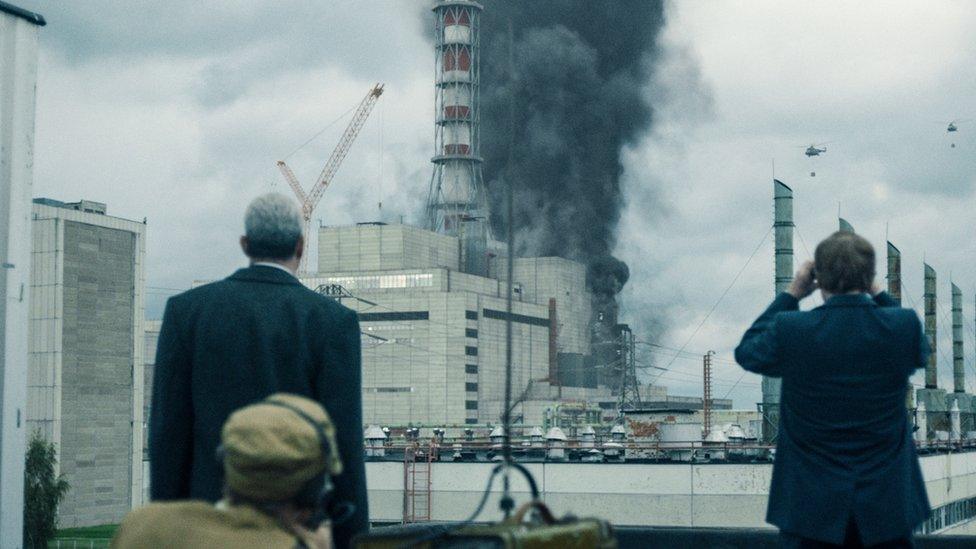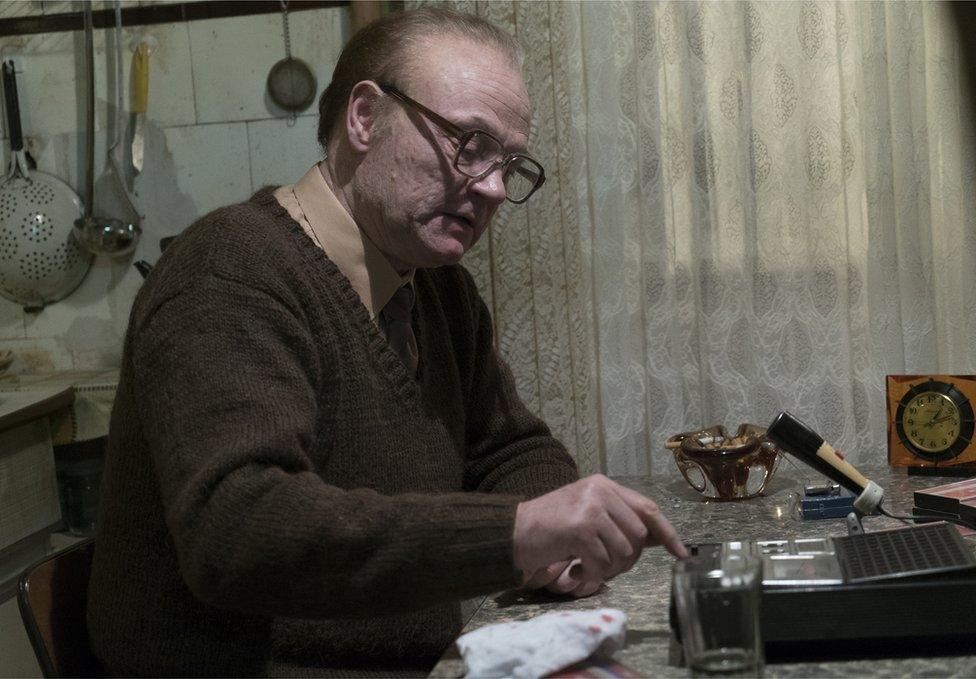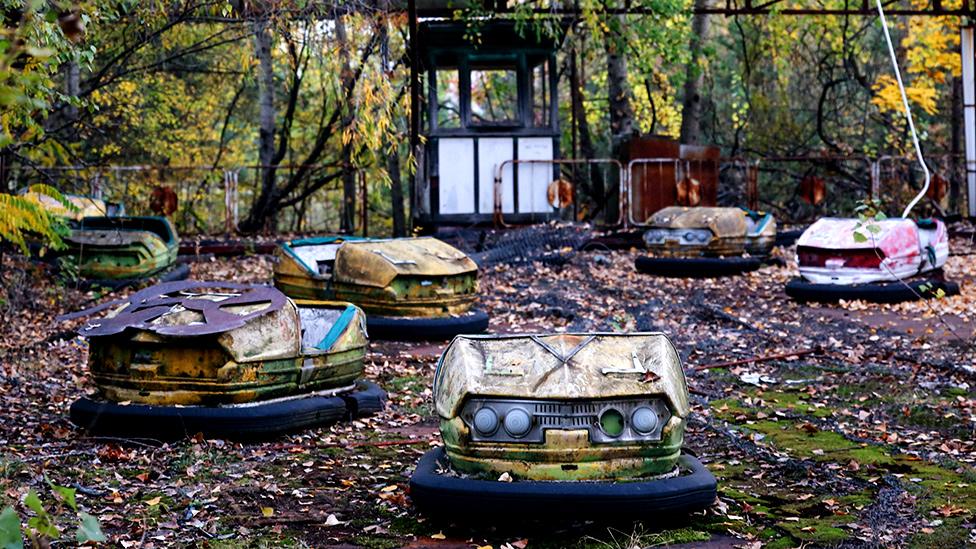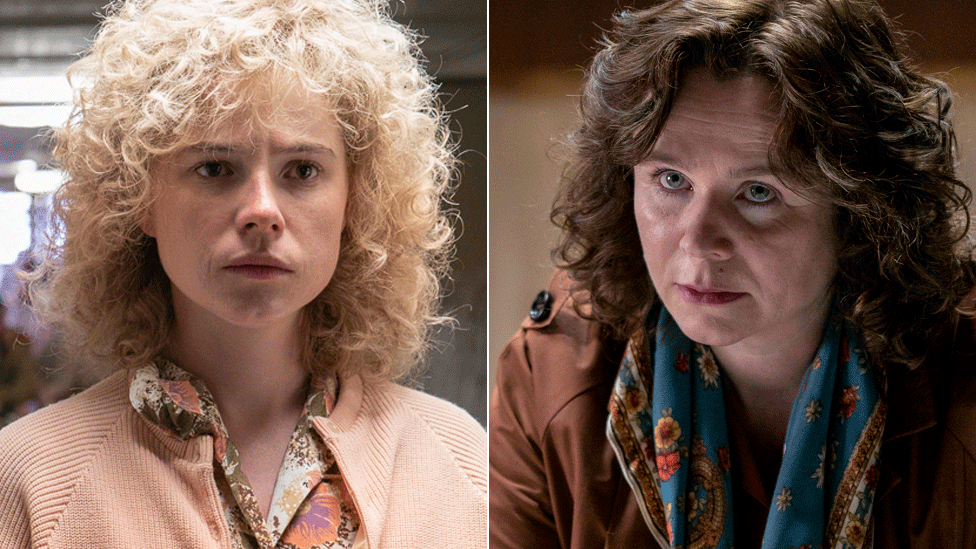Russia to make its own show about Chernobyl that implicates the US
- Published

At least 31 people were killed and many more were injured in what was the world's worst nuclear power accident
Russian state TV is working on its own version of Chernobyl, a series based on the worst nuclear accident in history.
The NTV drama will deviate from the acclaimed HBO series - and from historical reality - by claiming that the CIA was involved in the disaster.
Director Aleksey Muradov claims it will show "what really happened back then".
HBO's miniseries, which concluded on Monday, received the highest ever score for a TV show on IMdB, as well as a 9.1 rating on Russian equivalent Kinopoisk.
But in an interview with Komsomolskaya Pravda, Russia's most widely-read tabloid, Mr Muradov said his version of the show "proposes an alternative view on the tragedy in Pripyat, external".
"There is a theory that Americans infiltrated the Chernobyl nuclear power plant," he told the paper. "Many historians do not rule out the possibility that on the day of the explosion, an agent of the enemy's intelligence services was working at the station."
The Hollywood Reporter reports that the Russian culture ministry has contributed 30 million rubles ($463,000; £363,000) to the show.
The No. 4 reactor at the Chernobyl nuclear plant exploded on 26 April 1986 in the Ukrainian city of Pripyat.
At least 31 people were killed in the immediate aftermath, and the effects continue to be felt to this day.

What did Russia think of HBO's Chernobyl?

There has been plenty of praise in Russia for the authenticity of Chernobyl.
Izvestia newspaper declared it a more 'realistic' portrayal of the era than most Russian films manage. There's also admiration of how the series conveys the heroism of ordinary people.
But there's been a crescendo of criticism, too. One columnist declared the show a plot to undermine Russia's current atomic agency. Others called it American 'propaganda', blackening the image of the USSR and exaggerating the callousness of the Soviet response.
No-one disputes that it's got people talking. They're been busy sharing their own Chernobyl stories on social media, with younger Russians often hearing them for the first time. So one Twitter user thanked the series for 'giving us back our history.'
In the end, as one commentator concludes, external, the main reason for the backlash is likely a feeling of shame that it was the US that told the tale of Chernobyl, not Russia itself.

The show has been particularly unpopular with Russian state TV and the country's tabloid newspapers.
Speaking to TV website Teleprogramma, columnist Anatoly Wasserman said: "If Anglo-Saxons film something about Russians, it definitely will not correspond to the truth, external."
This, he continued, was not because "they don't like us" but because "they simply cannot understand us".
Komsomolskaya Pravda published several negative articles about the show - including one floating a conspiracy theory that it was produced by competitors of Rosatom, external, Russia's state nuclear company, to ruin the country's reputation as a nuclear power.

The show has been praised for its attention to detail
But reviewers in independent media outlets praised its writer Craig Mazin for his minute attention to detail.
Slava Malamud, a US-based journalist who grew up during the Soviet era in what is now Moldova, wrote on the independent Russian news site Meduza that "the respect and meticulousness the show's creators brought to their work is breathtaking, external".
"Like I see the license plate for a car in one scene has the real numbers for the [Kiev] region," he said. "Who's going to notice that in America or England?"

A challenge to rosy views of Russia's past
Adam Robinson, BBC Monitoring - The world through its media
For the Kremlin, the topic of history is a highly sensitive one - especially about the Soviet Union.
Official media now tend to paint a sanitised, idealised vision of the USSR, and portray Putin's Russia as its spiritual heir.
This makes it easy to see any critical view of the Soviet past as an attack on the Kremlin's ideological power base.
It's a narrative it seeks to completely control and guard from outside influences - particularly from a West it sees as hostile.
Some Russians feel the version of reality offered by Kremlin-controlled media is not entirely unlike the lies told by the Soviet state.
As a result, perhaps the most dangerous idea was the key question running though Chernobyl - what is the cost of lies?
BBC Monitoring, external reports and analyses news from TV, radio, web and print media around the world. You can follow BBC Monitoring on Twitter, external and Facebook, external.
- Published14 February 2019

- Published6 May 2019

- Published4 May 2019